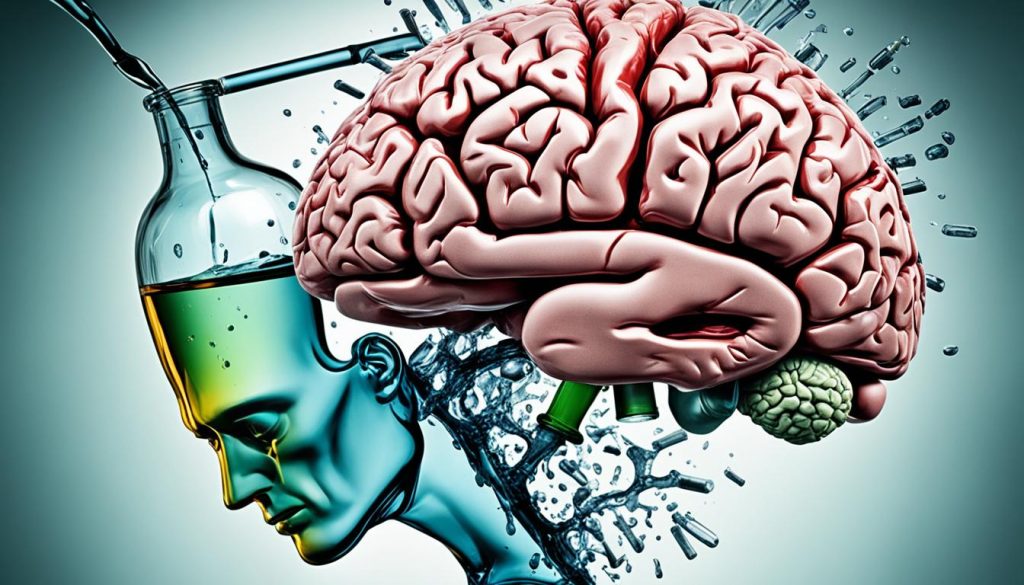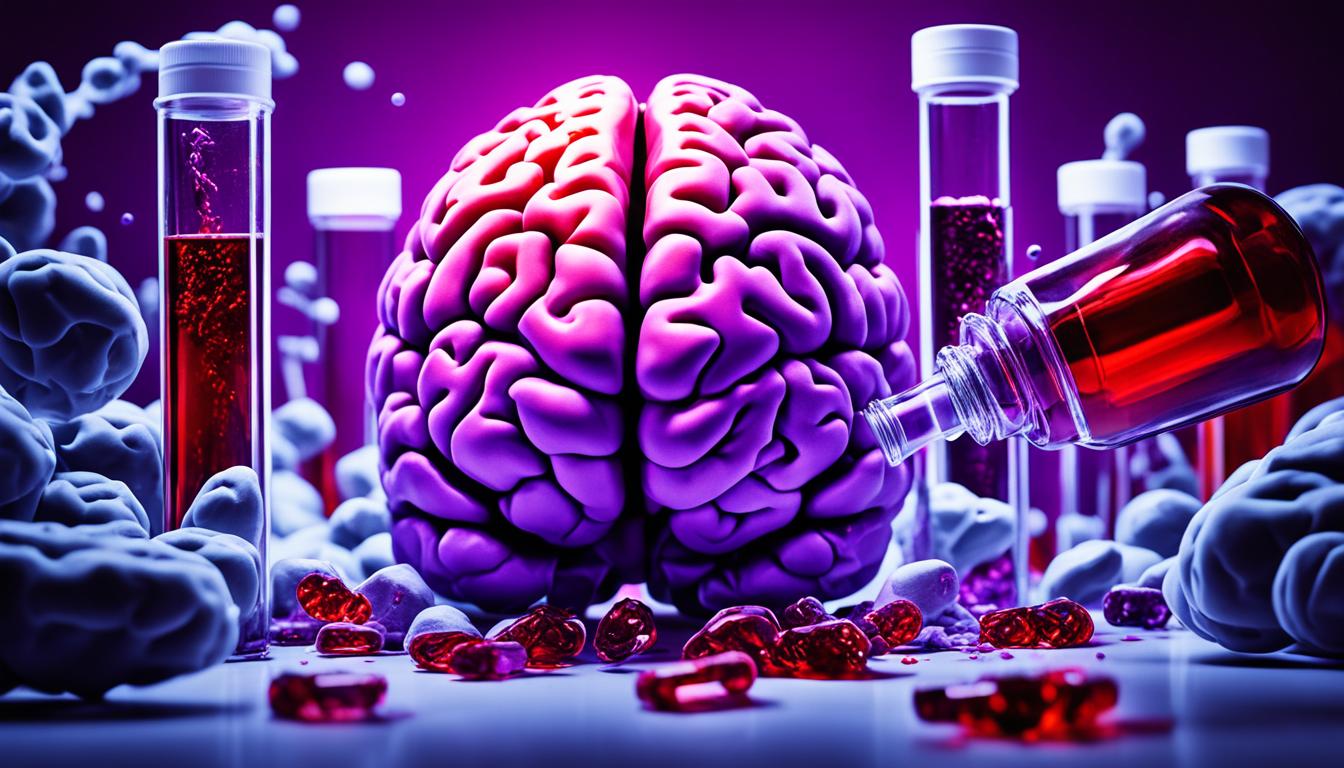Binge drinking is a big problem around the world. People often drink too much alcohol quickly. This can hurt both the body and mind. Knowing the signs, reasons, and ways to spot this problem is key. Lately, new treatments like stem cell therapy could help people who binge drink.
Key Takeaways
- Binge drinking means drinking a lot of alcohol fast.
- Signs of binge drinking include forgetfulness, not remembering things, and risky choices.
- Reasons for binge drinking can be peer pressure, stress, and not knowing the risks.
- Doctors can tell if someone binge drinks by talking to and checking them.
- Stem cell therapy might help by aiding recovery and making the brain work better.
Binge Drinking Effects and Consequences
Binge drinking affects both the body and mind a lot. Knowing the risks helps us make better choices. We should aim for healthier habits.
Physical Effects
Binge drinking seriously harms the liver. The liver processes alcohol, but too much can cause inflammation or disease. Problems like fatty liver, alcoholic hepatitis, and cirrhosis can happen.
It also affects the brain. Drinking too much alcohol disturbs how the brain works. It can make it hard to think, remember things, and judge situations. This can hurt a person’s life and happiness a lot.
Risk of Accidents and Injuries
Binge drinking makes accidents more likely. When people drink too much, they can’t move as well, react quickly, or think clearly. This leads to falls, car crashes, and other accidents. These can cause serious harm or even death.
Addiction and Dependence
Drinking a lot regularly can lead to addiction. Alcohol changes the brain, making it hard to stop drinking. This can damage someone’s health, relationships, and happiness.
Social and Personal Consequences
Too much drinking can also hurt friendships and family relationships. It can lead to fights and problems talking to each other. Drinking too much can also make it hard to do well in school or at work. It might ruin chances for a good education or career.
It can also cause legal troubles. People who drink too much might do things that break the law. This can lead to getting arrested or having legal problems.
Understanding binge drinking’s effects helps us choose wisely. It’s key to looking after our health and happiness.
| Effects | Consequences |
|---|---|
| Liver damage | Inflammation, fatty liver, alcoholic hepatitis, cirrhosis |
| Neurological problems | Impaired cognitive function, memory problems |
| Risk of accidents and injuries | Falls, car accidents, other mishaps |
| Addiction and dependence | Alcohol dependence, withdrawal symptoms |
| Social and personal consequences | Relationship difficulties, work and academic performance issues |
| Legal problems | Criminal charges, legal issues |
Binge Drinking Statistics and Prevention
Binge drinking is a big issue, especially among young adults and college students. Worldwide studies show worrying data on this topic. Knowing how widespread binge drinking is helps in tackling it better.
The Prevalence of Binge Drinking
About XX% of young adults binge drink regularly. This harmful drinking habit poses risks to individuals and affects society.
The Dangers of Binge Drinking
Binge drinking can cause accidents and injuries right away. It also leads to serious health problems over time. Issues like liver damage and brain problems can arise from heavy drinking.
It also hurts one’s relationships, school or work performance, and can lead to legal troubles.
Prevention Strategies
Preventing binge drinking is key to reducing its harmful effects. Education is crucial. It helps people understand binge drinking’s dangers and encourages smart drinking habits.
Policies that limit alcohol access and marketing to young people also help. They can reduce binge drinking’s popularity.
Support from the community is also vital. Things like counseling and support groups can help those at risk. These efforts help fight binge drinking.
Binge Drinking Prevention Table
| Prevention Strategy | Description |
|---|---|
| Educational Programs | Providing information about the dangers of binge drinking and promoting responsible alcohol consumption. |
| Policy Changes | Implementing regulations that restrict the availability and marketing of alcohol to young adults. |
| Community Initiatives | Creating supportive environments and offering counseling and support groups for individuals at risk. |
Through these strategies, we aim for a society with less binge drinking. This way, people can have healthier, safer lives.

Stem Cell Therapy for Binge Drinking
Binge drinking is serious and can hurt people’s lives. Most treatments use behavioral therapy and support groups. Now, there’s exciting research on stem cell therapy as a new way to help those with binge drinking issues.
Too much alcohol can harm the brain, causing problems with thinking and memory. Stem cell therapy might be the answer. It uses stem cells’ power to create new brain cells and fix the damage from drinking too much.
This therapy uses stem cells to fix the brain damage from drinking. It aims to make the brain work better and aid in recovery. The stem cells can help fix and refresh the brain, making it easier to think clearly and crave alcohol less.
Stem cell therapy for binge drinking is still being studied. Yet, the early results are hopeful. They give new hope for different and effective treatment choices.
The Potential of Stem Cell Therapy in Binge Drinking Treatment
Stem cell therapy is a new way to fix the brain damage from binge drinking. It can help heal the brain, which improves life for those struggling with binge drinking.
This therapy has benefits over traditional ones. Instead of just helping people cope, it fixes the actual brain damage. This makes it a more complete recovery method.
It could also get to the heart of why people binge drink by cutting alcohol cravings and helping the brain heal. This could lead to lasting sobriety and less chance of falling back into old habits.
Still, more studies and tests are needed to make this therapy widely available. Working together, scientists, doctors, and officials are key to moving forward. They will ensure the therapy is safe and works.
Conclusion
Binge drinking is a big problem for both people and society. It’s vital to know the symptoms, causes, and ways to diagnose it. Understanding these can help fight its effects. We need to spread the word, use prevention methods, and look at new treatments, like stem cell therapy.
This issue urgently needs better education and support. Giving people the right facts about the risks of too much alcohol can lead to smarter choices. We also need policies, school programs, and community efforts to encourage safe drinking habits.
Stem cell therapy brings new hope for those fighting binge drinking. Studies show that stem cells can fix damage caused by alcohol in the brain. This breakthrough could improve recovery programs, boost brain health, and make it easier to stay sober.

